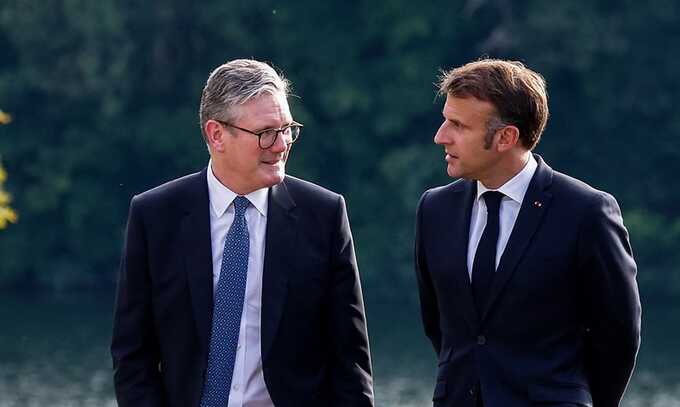Keir Starmer says he is open to processing asylum seekers offshore

PM wants to rethink UK’s immigration policies but did not make progress on returns deal at summit with EU leaders
Keir Starmer is looking into plans to process asylum seekers outside the UK as part of a rethink of the government’s immigration policies, even as a returns agreement with the EU appears more distant than ever.
The prime minister said on Thursday he was open to the idea of Britain processing claims offshore, after a day spent discussing illegal migration with fellow European leaders at Blenheim Palace. Those talks, as part of the European Political Community summit, included a meeting with Edi Rama, the Albanian prime minister, whose country processes asylum claims on behalf of Italy.
But he said a deal to return refused asylum seekers to the EU was low on his list of priorities, as the French president, Emmanuel Macron, warned his country was not willing to shoulder the additional burden.
Starmer said: “In relation to the agreement between Albania and Italy, obviously there’s interest in how that might work, but that wasn’t actually the central discussion in the taskforce in the roundtable. That was about the practical measures that we want to discuss, which is about how we deal with taking the gangs down in the first place.
“But look, I’m a practical person. I’m a pragmatist. And I’ve always said we’ll look at what works and where cases can be processed closer to origin, then that is something which of course ought to be looked at.”

The Albanian prime minister, Edi Rama, at the European Political Community summit at Blenheim Palace in Woodstock, Oxfordshire on 18 July. Photograph: Anadolu/Getty Images
Speaking about the idea of a new returns agreement with the EU, which Starmer said before the election that he intended to pursue, he added: “The returns agreement only comes into being at the end of the process; my focus is at the beginning of the process, to make sure we actually secure our borders.
“Because the problem we’ve got at the moment is we’ve got tens of thousands of people who are here who shouldn’t be here who aren’t being processed.”
Starmer’s press conference was followed immediately by one by Macron, who told reporters: “If [the Brits] want to fix the situation in the Channel it is not just a bilateral [solution]. We will not take the full burden of those who are just going through France to join you.”
The summit at Blenheim, which took place on Thursday, was a chance for Starmer to reset Britain’s relations with the EU, with the new government looking for improved arrangements not only for migration but also on security and agricultural trade.
The prime minister told more than 40 European leaders that he wanted to repair ties with them after years of strained relations after the vote to leave the EU.
“We want to work with all of you to reset relationships, rediscover our common interest and renew the bonds of trust and friendship that brighten the fabric of European life,” he told them. He also reassured them that under his government Britain would never leave the European convention on human rights.
Other leaders spoke warmly of Starmer’s diplomatic efforts, even as British ministers admitted that formal renegotiations were a way off. Macron said the prime minister had brought “new momentum” to “political life and domestic politics”.
Starmer said his fellow heads of government had agreed with his approach of tackling illegal migration by clamping down on people-smuggling gangs, and announced the UK would cooperate more closely with Europol in The Hague to help do so.
In the short term, however, the prime minister is under pressure to bring down the number of people crossing the Channel, with more than 10,000 having done so already this year. He told reporters on Thursday: “We’ve inherited a really bad problem from the government … We’ve got record numbers this year, and we can’t switch that in 24 hours, in one week.”
Labour has been investigating an offshore processing plan since before the election as one way to reduce small boat crossings. The party explored a similar solution when last in government, with the then home secretary. David Blunkett. investigating the possibility of sending asylum seekers to Tanzania.
Government officials say they are willing to pursue such a scheme as long as it fulfils three criteria: that it deters new asylum seekers from coming, that it is cost effective and that it complies with international law. One senior official on Thursday described the deal between Italy and Albania as “innovative”.
The idea is likely to prove controversial and refugee charities have already called the idea “immoral”. The charity Care4Calais previously said: “Outsourcing our international obligations to other countries is a shameful policy where everyone loses.”
Read more similar news:
Comments:
comments powered by Disqus

































